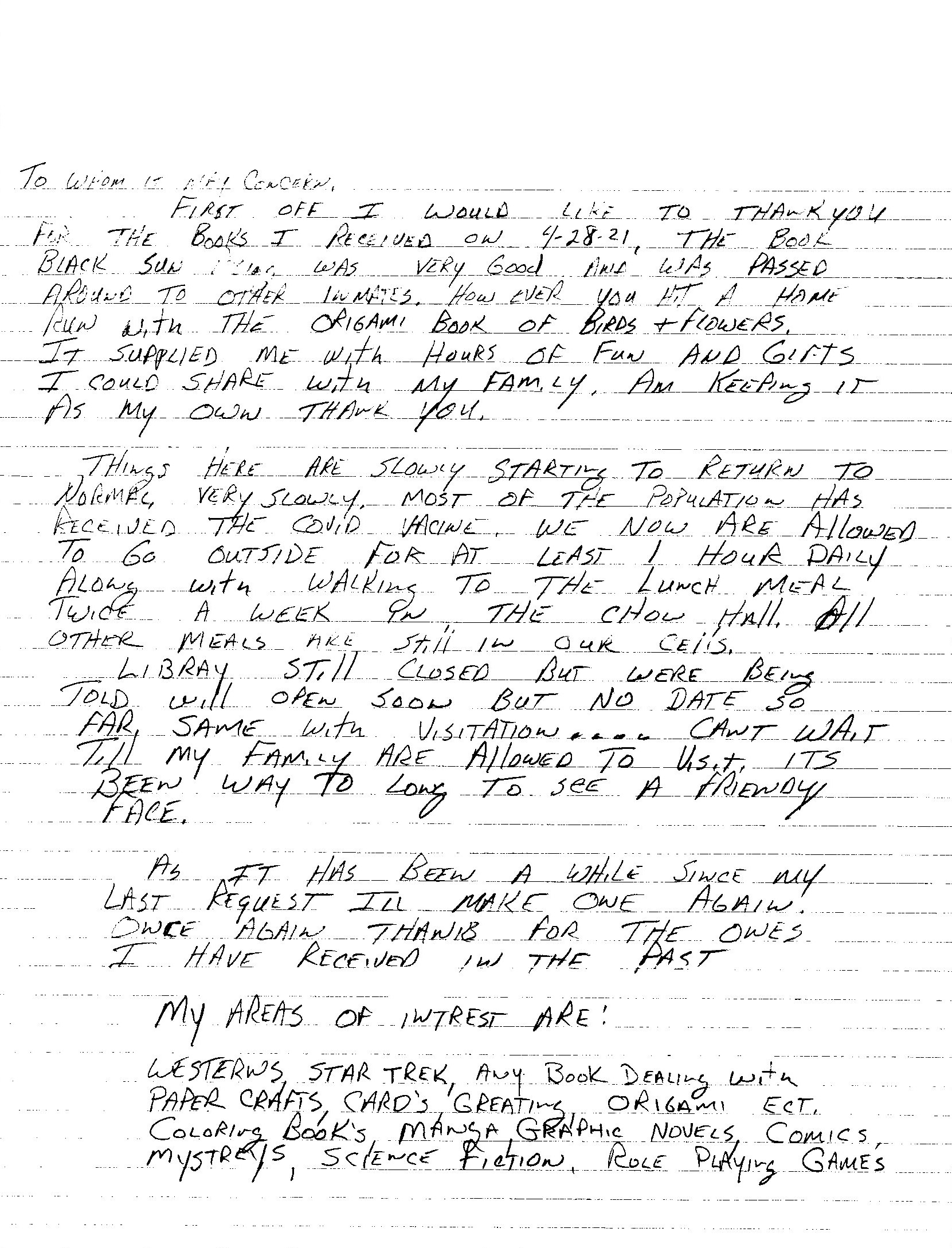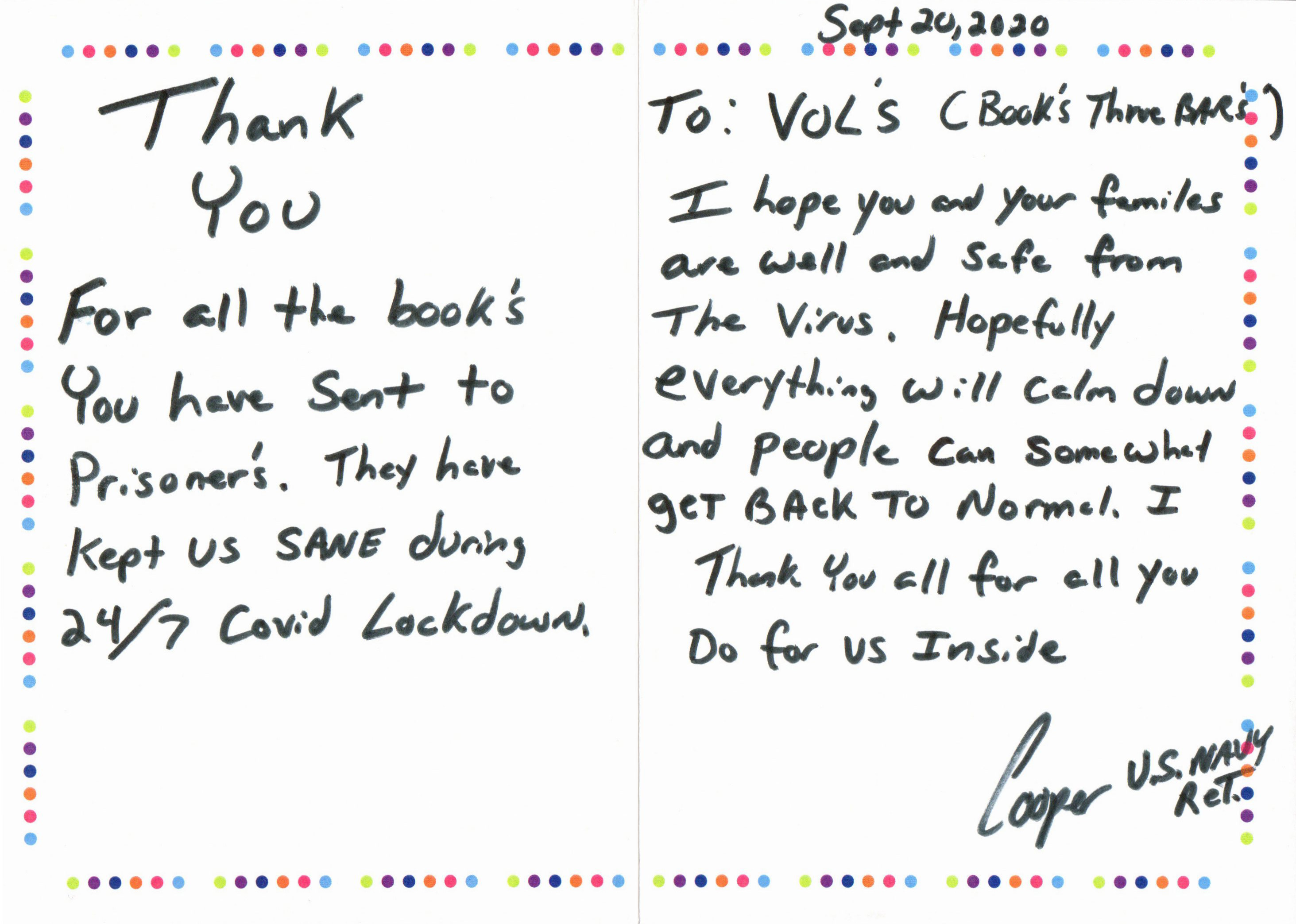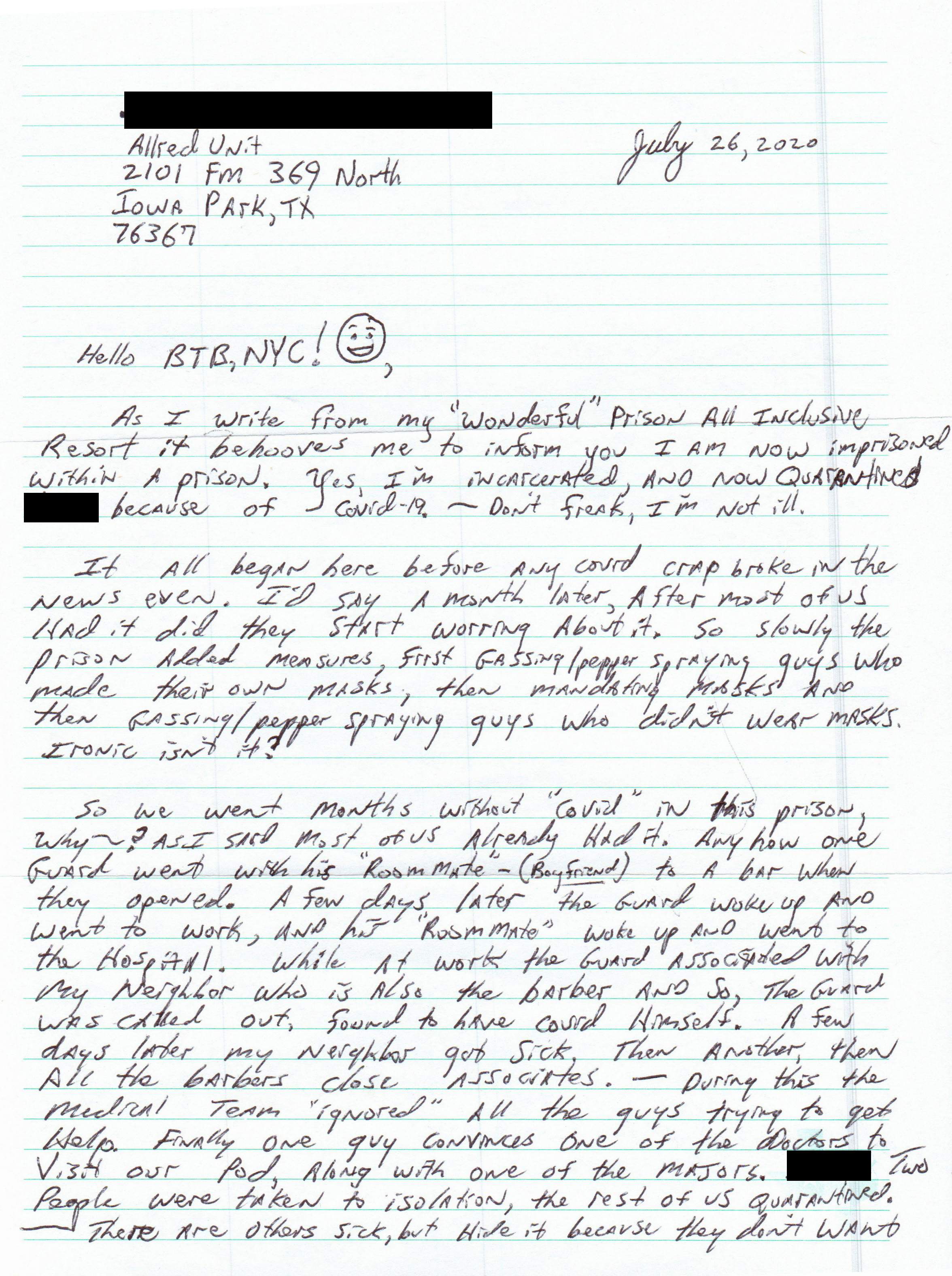NYC Books Through Bars during the
COVID-19 Outbreak
NYC Books Through Bars
NYC Books Through Bars responds to letters from people incarcerated by the injustice system, which pervades multiple levels of government. Over the years, we have received many letters from people in solitary confinement or without access to books, education, or a library. During the COVID-19 pandemic, the number of such letters skyrocketed as a health emergency landed massive numbers of people in solitary or solitary-like conditions.
![]()
![]()
![]()
![]()
Some letters NYC Books Through Bars recieved from incarcerated people




Some letters NYC Books Through Bars recieved from incarcerated people
Where they exist, libraries for the incarcerated, like the prison industrial complex’s other programs, have been largely suspended. Even where library programs exist, solitary confinement prevents people from accessing them. Books Through Bars, however, is able, in some cases, to help overcome this barrier. One letter-writer from California expressed gratitude for our programming’s workaround. Placed in solitary, the writer stated: “[Thank you] for sending me great books while I was trapped in the hole. You couldn’t believe how much it helps.” Similar feelings were communicated in mail from a person held in administrative segregation in Texas. As a result of the prison industrial complex labeling them a gang member, this individual had been detained for eleven years. They wrote to us that the “‘powers that be’ use that to hold me captive here. I’m restricted to my cell 22-1/2 hours a day with 1-1/2 hours’ time for recreation and a shower. So, books are my lifeline between sanity and me going ‘ballistic’…” Someone in solitary for over two years shared another common sentiment when explaining, “I would like any subject [of books], and I really mean any. I would be extremely thankful for anything you could send me. I’m in the hole at ... since ...“ As these remarks indicate, incarcerated people are eager to engage the content we share with them. This desire is especially urgent for those in solitary, which exacerbates individuals’ lack of access to education and books from prison while also creating or worsening their poor mental health prospects there.
We seek to mitigate the isolation that incarcerated people feel and empower them with resources and access to community. Letter-writers frequently tell us about how books help them to learn and to understand that they are not alone. Another person from Texas wrote, “I want you to know that what you do matters. The books you have sent me are serving to open my eyes, expand my horizon, free my mind, and are a great encouragement. In them I find that I am not alone in this. People here ARE blind. The crazy unjust things I observe ARE actually happening and, although most of my peers shrug these things off. This is NOT OK.” Writing to encourage us and similar Books Through Bars programs, one writer concluded by saying, “Hopefully the government, corona-virus, or even a giant snake can’t stop ya’ll from giving us a lil’ bit of freedom.”
The letters often mention that people on the inside share the books that we supply with others there or give them to the prison library. Another letter from Texas (we get over half our letters from Texas) begins by telling us that “y’all are Awesome & I always pass on and share what y’all send me.” The letter, sent from death row, concluded by stating, “Once again, thank you for helping keep D-row live...” We also receive many pieces of art, either in initial letters or with thank-you notes. Some of this art is on our website.
New York City Books Through Bars sends approximately 10,000 packages of books a year to forty states and Puerto Rico. Our program also strives to make available types of literature that may not be readily available through a prison library, such as indigenous resistance, LGBTQ+, radical, and feminist books, among others. One request sent to us reads, “[Thanks] for sending me those Black revolutionaries’ books. I really enjoyed them. Can you please send me more Black History Books...” The letters that we receive confirm that there is a dire demand for books and educational content in prison. As much as we try to address the demand, we know that obstacles to these resources—along with resources for medical supplies and other basic needs—are part of a systemic institutional problem that exceeds our program’s purview.
In 2018, we faced challenges when the New York State Department of Corrections and Community of Supervision (DOCCS) proposed a policy, Directive 4911A, which would have restricted prisoners from receiving packages from family members and the public. Instead, books would only be available for purchase through a handful of private for-profit vendors—in other words, not programs like ours. A coalition of groups representing the family members of those incarcerated, allied prisoners’ rights organizations, and the media organized around our cause. Two weeks after these groups mounted opposition to Directive 4911A, the DOCCS withdrew it.
More information about book-banning policies, based on our experiences, is available on our website.
Literacy and access to reading material are human rights. We send books directly to people because we believe that political education is necessary for liberation.
Daniel Schaffer
Collective Member, New York City Books Through Bars
We seek to mitigate the isolation that incarcerated people feel and empower them with resources and access to community. Letter-writers frequently tell us about how books help them to learn and to understand that they are not alone. Another person from Texas wrote, “I want you to know that what you do matters. The books you have sent me are serving to open my eyes, expand my horizon, free my mind, and are a great encouragement. In them I find that I am not alone in this. People here ARE blind. The crazy unjust things I observe ARE actually happening and, although most of my peers shrug these things off. This is NOT OK.” Writing to encourage us and similar Books Through Bars programs, one writer concluded by saying, “Hopefully the government, corona-virus, or even a giant snake can’t stop ya’ll from giving us a lil’ bit of freedom.”
The letters often mention that people on the inside share the books that we supply with others there or give them to the prison library. Another letter from Texas (we get over half our letters from Texas) begins by telling us that “y’all are Awesome & I always pass on and share what y’all send me.” The letter, sent from death row, concluded by stating, “Once again, thank you for helping keep D-row live...” We also receive many pieces of art, either in initial letters or with thank-you notes. Some of this art is on our website.
New York City Books Through Bars sends approximately 10,000 packages of books a year to forty states and Puerto Rico. Our program also strives to make available types of literature that may not be readily available through a prison library, such as indigenous resistance, LGBTQ+, radical, and feminist books, among others. One request sent to us reads, “[Thanks] for sending me those Black revolutionaries’ books. I really enjoyed them. Can you please send me more Black History Books...” The letters that we receive confirm that there is a dire demand for books and educational content in prison. As much as we try to address the demand, we know that obstacles to these resources—along with resources for medical supplies and other basic needs—are part of a systemic institutional problem that exceeds our program’s purview.
In 2018, we faced challenges when the New York State Department of Corrections and Community of Supervision (DOCCS) proposed a policy, Directive 4911A, which would have restricted prisoners from receiving packages from family members and the public. Instead, books would only be available for purchase through a handful of private for-profit vendors—in other words, not programs like ours. A coalition of groups representing the family members of those incarcerated, allied prisoners’ rights organizations, and the media organized around our cause. Two weeks after these groups mounted opposition to Directive 4911A, the DOCCS withdrew it.
More information about book-banning policies, based on our experiences, is available on our website.
Literacy and access to reading material are human rights. We send books directly to people because we believe that political education is necessary for liberation.
Daniel Schaffer
Collective Member, New York City Books Through Bars